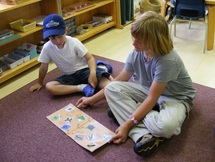
But what if in loco parentis were reversed? What if, rather than schools acting like parents, parents acted like schools? How might that work?
Well, to begin with, activities around the home would have to be quite a bit more regimented. Perhaps you could install bells or chimes to indicate when it was time to move from one activity to another. Buzz, "sorry kids, Lego time is over - let's move on to colouring between the lines"; buzz, "let's go run around the yard" (that's the royal let's - you kids run - I'll time you); buzz, "time to eat"; buzz, "stop eating, whether or not you are finished, and go outside in the rain", etc.
Sibling rivalry would be a thing of the past, as every child would be treated exactly the same. (Now in fairness, a friend of mine did treat her two children exactly the same in spite of their three year age gap. It was certainly entertaining to see a 1 year old get a Fisher Price "Alpha Probe" to match his 4 year old brother's Christmas wish!)
Everything your child did would be assessed and reported on, parents could post charts showing which child was the best in each of a number of arbitrary categories: top bed maker; dish clearer; tooth brusher; etc. and issue press releases for each swimming level mastered or consecutive successful visits to the dentist. Any of your children who failed to meet your expectations in any of these important skill areas would be told that they lack "grit" and that their failure to swim the backstroke was due to the fact that they had a fixed mindset that made them insist on going forward instead.
Discipline would definitely be easier. If your child misbehaved, you could simply call the school and tell them to keep her or him there for the next few days. Repeated offences would have them staying at school permanently.
Finally, when all else failed, parents would not have to take any responsibility for their lack of success in parenting. After all, they could just blame the school. Oh, wait a minute, they already do that!
Let's face it, following the principle of in loco schola makes little sense for parents. But, maybe if we educators really believed in the importance of in loco parentis, we could consider following a different kind of approach when working with our students. In fact, what if we really acted like parents? What if every school treated each child as if her or his success was critically important to us? What if we actively searched for ways in which every student could learn effectively? What if our first response was always to believe what a child says and not try to pick apart their stories? What if we respected the fact that family life is complex, and that not every night at home is going to be conducive for completing homework? What if we stopped playing children off of one another with stars and stickers and class rankings and pep rallies? What if we acted the way that we expect our students' parents to act- to be supportive, to communicate regularly, to check agendas and sign homework, to encourage, to give second (and third and fourth) chances - to treat our students with dignity and respect; and, to assess their work as an instructional tool - not as a judgement of individual worth?
You see, in loco parentis is not actually a legal construct at all, it is a philosophy of teaching and learning. The more that schools and administrators and teachers become cheerleaders, coaches and advocates for children, rather than taking on the roles of judge, jury and executioner, the better the chance they have for success.
No, parents should not act like schools. And, for their part, schools must not take on the role of parents, but rather must embrace each parent's belief in her or his individual child. That is the true measure of the home/school partnership, and the secret for student success.



 RSS Feed
RSS Feed
